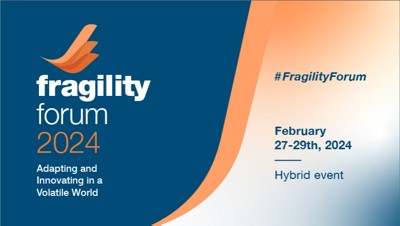
- OVERVIEW
- THEMES
- PARTNERS DAY
Fragility, conflict, and violence (FCV) is a global challenge. By 2030, almost 60 percent of the world's poor will live in countries classified as fragile and conflict-affected situations (FCS). Chronic instability, civil wars, the global shock of the pandemic, and continued climate disasters have created a complex landscape of intertwined risks, reversing hard-won development gains. Not only are these dynamics affecting people’s lives within these countries, but they also have destabilizing transboundary effects that compel all of us to think and act in new ways.
The Fragility Forum 2024 (FF2024), Adapting and Innovating in a Volatile World, provided an opportunity for those working in and on FCV, including those in the development, humanitarian, government, civil society, private sector, research, and security communities, to exchange experiences, and examine the success and failures of developmental interventions in countries affected by fragility, conflict and violence.
FORMAT
Organized over three days in a hybrid format, the FF2024 offered a diverse range of sessions, including high-level panel discussions and technical sessions organized around the four thematic areas. Complementing these sessions, the FF2024 offered creative and interactive learning events to engage participants, promote networking, highlight successes, and showcase innovations. These included talk-shows to showcase entrepreneurs, artists, and athletes, lightning talks around innovations, chai chats on ideas that have worked and ready to be scaled-up, and a technology segment that showcased cutting-edge tools and techniques. There was an opportunity to network and chat informally in the FCV café.
Watch recorded sessions
Fragility Forum YouTube Channel
Agenda
Fragility Forum | Partners Day
RELATED
Fragility, Conflict & Violence
Questions?
Email us: fragilityforum@worldbank.org
The Forum’s sessions were curated around four themes:
- Learning from our experiences in FCV: This central theme took a dispassionate look at successes and failures of development efforts to address drivers of fragility and mitigate its impacts. The aim was to learn from our collective experience and strengthen and adapt our interventions in complex, evolving FCV situations. Sessions explored a range of FCV challenges, including state-building in protracted crisis, security and development, transitioning out of conflict, sustaining engagement during political transitions and turmoil, working in insecure environments, and better supporting upstream prevention. Other topics included strengthening state capacity and legitimacy, forced displacement, and working effectively at the intersection of humanitarian response and development.
- Fostering resilience in complex risk environments: Building resilience is central to tackling complex crises. But more understanding is needed around resilience, particularly in FCV settings. The objective of this essential theme was to better understand the peace and prevention aspects of resilience, and to explore approaches to supporting multi-dimensional resilience in protracted crises and complex risk environments. Sessions explored different actors’ perspectives on resilience, challenges around climate change vulnerability and financing gaps, institutional structures and incentives for greater impact in low-capacity environments, resilience as it relates to peacebuilding, and supporting peaceful and inclusive community resilience to prevent violent extremism.
- Addressing FCV in Middle income countries (MICs): FCV is as prevalent in middle-income countries as in low-income countries, threatening development outcomes and economic gains. Specific MIC-focused sessions explored FCV drivers that are present in MICs, such as subnational conflict, interpersonal and criminal violence, and corruption, and MICs will be featured in sessions across other themes.
- The private sector in FCV: This theme focused on fostering conditions for private sector investments in FCV settings, recognizing the role of the private sector in creating jobs and livelihoods in FCV settings, boosting resilience, delivering services, and supporting investment and growth. Sessions explored topics such as financial sector sustainability and integrity, strengthening domestic private sector, innovative approaches to financing, private sector solutions to forced displacement, and crisis risk financing.
Partners Day: a Voice for Partners
To complement the Fragility Forum, a dedicated Partners Day (PD) was held on March 1, 2024 enabling partners to organize and host FCV-related sessions in smaller settings. It was designed to foster collaboration and provide a platform for dialogue across a range of thematic areas. The program comprised 33 partner-led sessions, most being open-door.
Disclaimer: The facilitation of partner-led events on March 1 did not imply an endorsement by the World Bank of individual sessions or themes. The contents, statements, and interpretations expressed in the Partners Day sessions did not necessarily reflect the views of the World Bank, the Executive Directors of the World Bank or the governments they represent.
Date: February 27 - 29, 2024 ET
Location: Washington, D.C.
